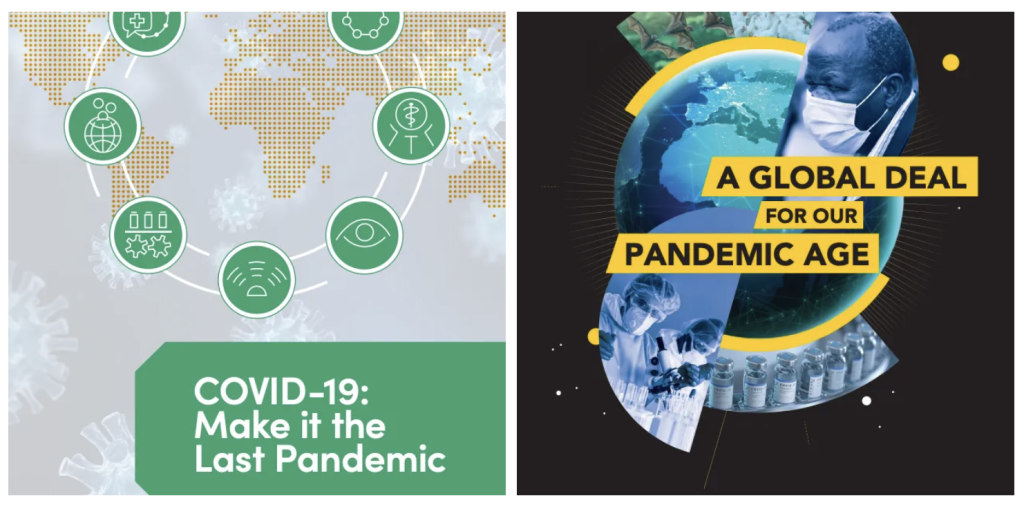Summoning the “Pact for the Future”. A New Global Order with a Digital Control System Run by “Trustworthy” AI
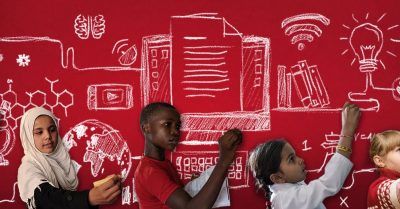
All Global Research articles can be read in 51 languages by activating the Translate Website button below the author’s name (only available in desktop version).
To receive Global Research’s Daily Newsletter (selected articles), click here.
Click the share button above to email/forward this article to your friends and colleagues. Follow us on Instagram and Twitter and subscribe to our Telegram Channel. Feel free to repost and share widely Global Research articles.
Donation Drive: Global Research Is Committed to the “Unspoken Truth”
***
Preparations have now begun for this year’s Summit of the Future, that will be held September 22–23 at the United Nations headquarters in New York.
During this meeting world leaders will sign the outcome document “The Pact for the Future”.
This will be agreed in advance through intergovernmental negotiations and is based on United Nations Our Common Agenda and the fullfilment of Agenda 2030 with its 17 Sustainable Development Goals.
A zero draft of the pact was released January 26th after input from over 500 Major Groups and other Stakeholders.[1] It was presented by the co-facilitators in the UN Trusteeship Council and followed by a debate with member states representatives January 29th.[2]
As described on the Summit of the Future webpage:
The result will be a world – and an international system – that is better prepared to manage the challenges we face now and in the future, for the sake of all humanity and for future generations.[3]
The purpose is to “take action to safeguard the future for present and coming generations”. Crises management is at the Pact’s core. And there is no lack of crises in need of effective management. As described in the zero draft:
We are at a moment of acute global peril. Across our world, people are suffering from the effects of poverty, hunger, inequality, armed conflicts, violence, displacement, terrorism, climate change, disease, and the adverse impacts of technology. Humanity faces a range of potentially catastrophic and existential risks.[4]
But with crises comes opportunities. At least for some powerful actors.
The goal of the pact should, according to United Nation’s High-Level Advisory Panel on Effective Multilateralism, be: “a global transition by States and non-State actors to a circular economy, addressing both supply and demand in a way that achieves balance with the planet.” This is a technocratic concept.
The HLAB was set up in March 2022 by Secretary General António Guterres to advise the Member States
“on those issues of key global concern where governance improvements are most needed.”
Their report, A Breakthrough for People and Planet: Effective and Inclusive Global Governance for Today and the Future, recommends six transformative shifts to “support a radical shift in international cooperation for the resolution of shared global challenges and the advancement of the 2030 Agenda for Sustainable Development”. These are:
- Rebuild trust in multilateralism – Improve legitimacy and effectiveness through inclusion and accountability
- Planet and People – Regain balance with nature and provide clean energy for all
- Global Finance – Ensure sustainable finance that delivers for all
- Digital and Data Governance – Support a just digital transition that unlocks the value of data and protects against digital harms
- Peace and Prevention – Empower effective, equitable collective security arrangements
- Anticipatory Action – Strengthen governance for current and emerging transnational risks
This has been anchored from the top echelons of power.
Among the members in the HLAB on Effective Multilateralism were WEF-board member Tharman Shanmugaratnam (newly elected President of Singapore), WEF Young Global Leader Ilona Szabó de Carvalho, Rockefeller Foundation-trustee Donald Kaberuka and Council on Foreign Relations and Trilateral Commission member, Ann-Marie Slaughter.
Their advice is a recipe for a world-wide technocratic management system that, if everything goes according to plan, will be guided by the global public–private partnership that was formalised in June 2019 with the signing of United Nation’s and World Economic Forum’s strategic partnership.
The intergovernmental forum G20 will have an important role to anchor these ambitions, influence legislators and implement the policies nationally.[5]
Since the adoption of the 2016 G20 Action Plan on the 2030 Agenda for Sustainable Development, G20 Leaders have consistently recognized the key role of the G20 in contributing to implementation of the 2030 Agenda.[6]
Our Common Agenda and the “Pact for the Future” can be seen as the United Nations’ answer to the call for a Great Reset that was announced in June 2020 by Klaus Schwab, António Guterres and Prince Charles (King Charles III). In the words of Guterres:
The Great Reset is a welcome recognition that this human tragedy must be a wake-up call. As you rightly say, it is imperative that we reimagine, rebuilt, redesign, reinvigorate and rebalance our world…
We must build more equal, inclusive and sustainable economies and societies that are more resilient in the face of pandemics, climate change and many of the other global challenges we face.
Behind the fine wording of “equal” and “inclusive” hides a technocratic collectivist management system that leaves little room for free choice by individuals. What they have in mind is the building of a digital control grid to oversee and manage the world. A sort of digital world brain.
You will be required to transform your values, “serve the common good” and connect to the digital world brain. It will also give immense power to the UN-system and partnering organisations in case of a global planetary emergency.
During the last year, eleven Policy Briefs have been released about how to achieve the twelve commitments that were proposed in Our Common Agenda by General Secretary Guterres.
The policy process is also interlinked with the negotiations on a new WHO Pandemic Accord (and an update of the International Health Regulations) that is planned to be concluded at World Health Assembly in May.
The accord goes hand in hand with the proposed “Emergency Platform” (Policy Brief 2) that will be convened by the UN General Secretary in case of a complex global shock including “future pandemics with cascading secondary impacts”.
Member States should according to the policy brief therefore “improve preparedness not only for health-related crises but also for other challenges and crises”. The aim is a set of protocols that will be activated in case of a major crisis.
HLAB Co-chair Ellen Sirleaf headed the WHO Independent Panel on Pandemic Preparedness and Response (2020-21) whereas Tharman Shanmugaratnam headed the G20 High Level Independent Panel on Financing the Global Commons for Pandemic Preparedness and Response (2021). Both these reports have served as a foundation for the proposed accord.
However, according to WHO Director General Tedros Adhanom Ghebreyesus, the accord is threatened because of “fake news, lies and conspiracy theories” that undermines the process.[7] This is something that is addressed in the Policy Brief Information Integrity on Digital Platforms.
Mis- and disinformation are having a profound impact on democracy, weakening trust in democratic institutions and independent media, and dampening participation in political and public affairs.[8]
It means that this problem has to be managed. Countering mis- and disinformation is an important part of the UN/WEF/G20 agenda.[9]
The eleven Policy Briefs contain the blueprint for a digital system (Global Digital Compact) that will be run with the help of “trustworthy” Artificial Intelligence. We can assume that “trustworthy” means that it will not criticise UN policies (like the SDGs and The Paris Agreement). The AI has to be in tune with the “Al Gore rhythm”.
“Pact for the Future”: Summary of the Policy Briefs
Below is my presentation of the main components in the proposed “Pact for the Future”, followed by an oversight of the Policy Briefs, key proposals and projects currently being developed by United Nations and external affiliated actors.
“Population Control”
1. Safeguarding the Future
Halt and prevent developments that could threaten the survival of future generations
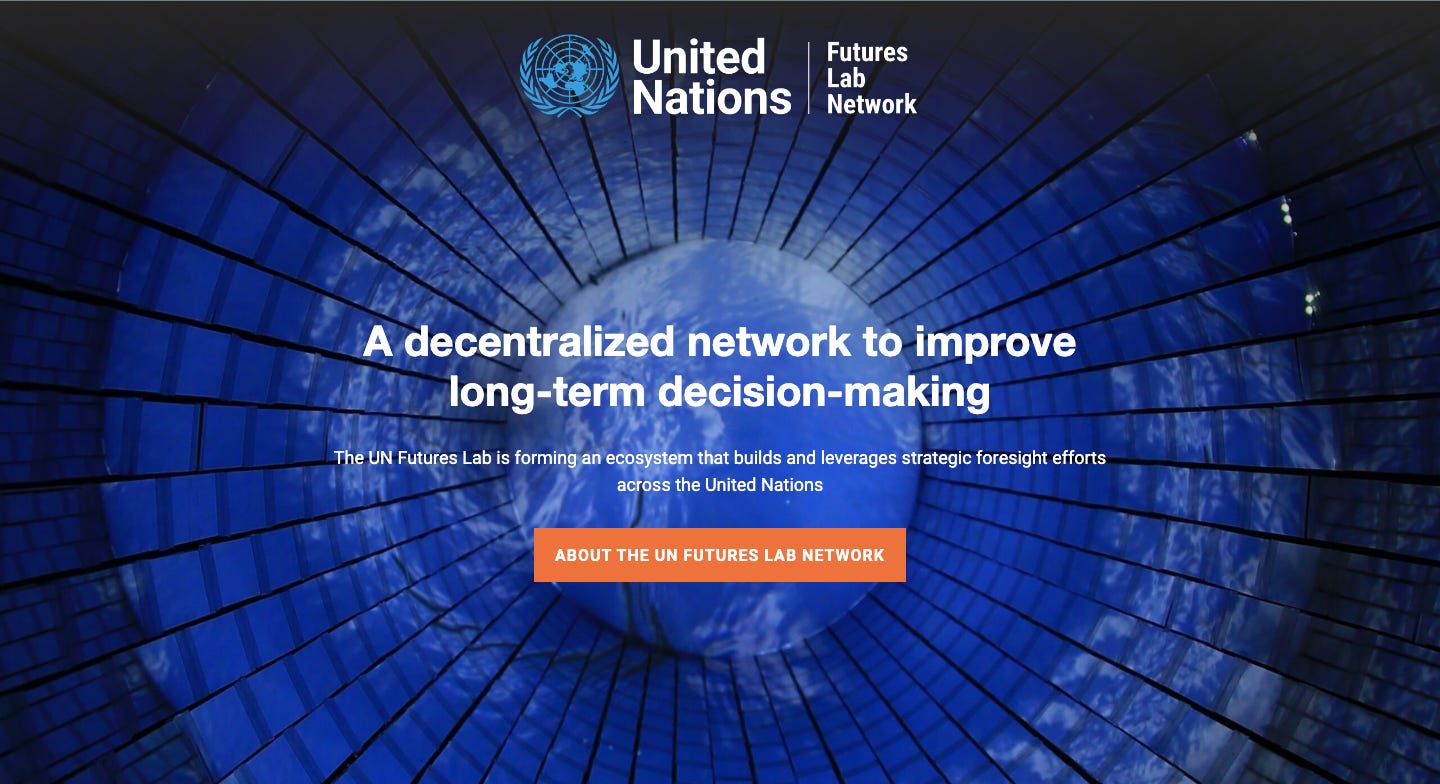
- Envoy for Future Generations
- Declaration on Future Generations
- Intergovernmental Forum for Future Generations
- Futures Lab Network
- UN Global Pulse
The goal of the UN Futures Lab is to improve long-term decision-making, by guiding teams in putting foresight into practice and providing frameworks and capacity-building that empower them to build the resilient, anticipatory United Nations the world needs.[10]

“Martial Law”
2. Managing Global Shocks
Rapid international response to complex global shocks
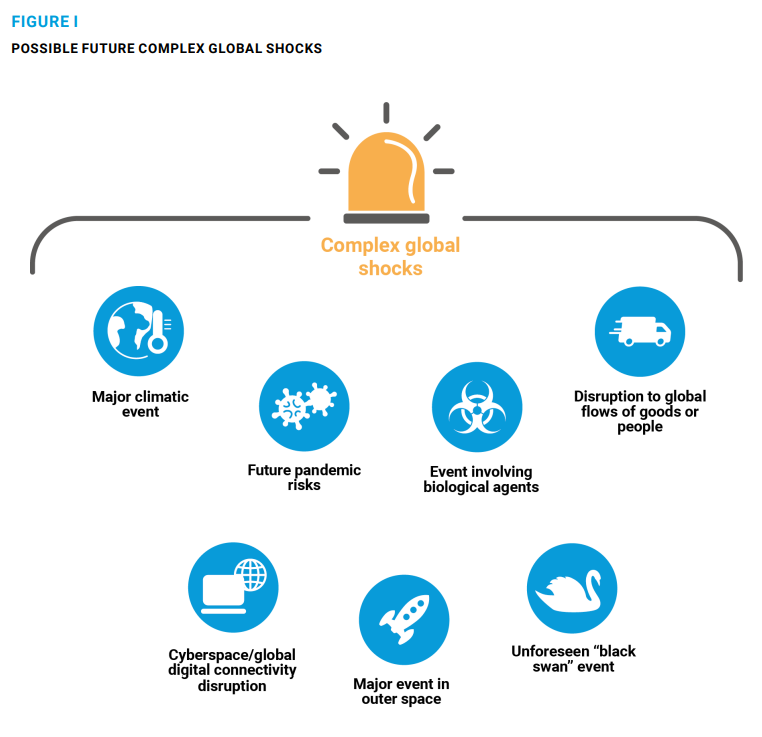
- Emergency Platform
- Planetary Emergency Partnership (Club of Rome, PIK, WWF)
- Planetary Emergency Plan (Club of Rome)
- Global Commons Alliance (Project by Rockefeller Philanthropy Advisors)
The platform would not be a new permanent or standing body or institution. It would be triggered automatically in crises of sufficient scale and magnitude, regardless of the type or nature of the crisis involved.[11]

“Youth Activism to Transform the World”
3. Meaningful inclusion of Young People
Make youth into “torchbearers” for the SDGs

- Global standard for meaningful youth engagement
- Framework to track progress
- UN Youth Townhall Meetings
- Envoy on Youth
- UN Youth Strategy
In recent years, young people have become a driving force for societal change through social mobilization – pushing for climate action, seeking racial justice, promoting gender equality and demanding dignity for all.[12]

“Data Collection”
4. Measuring what we value
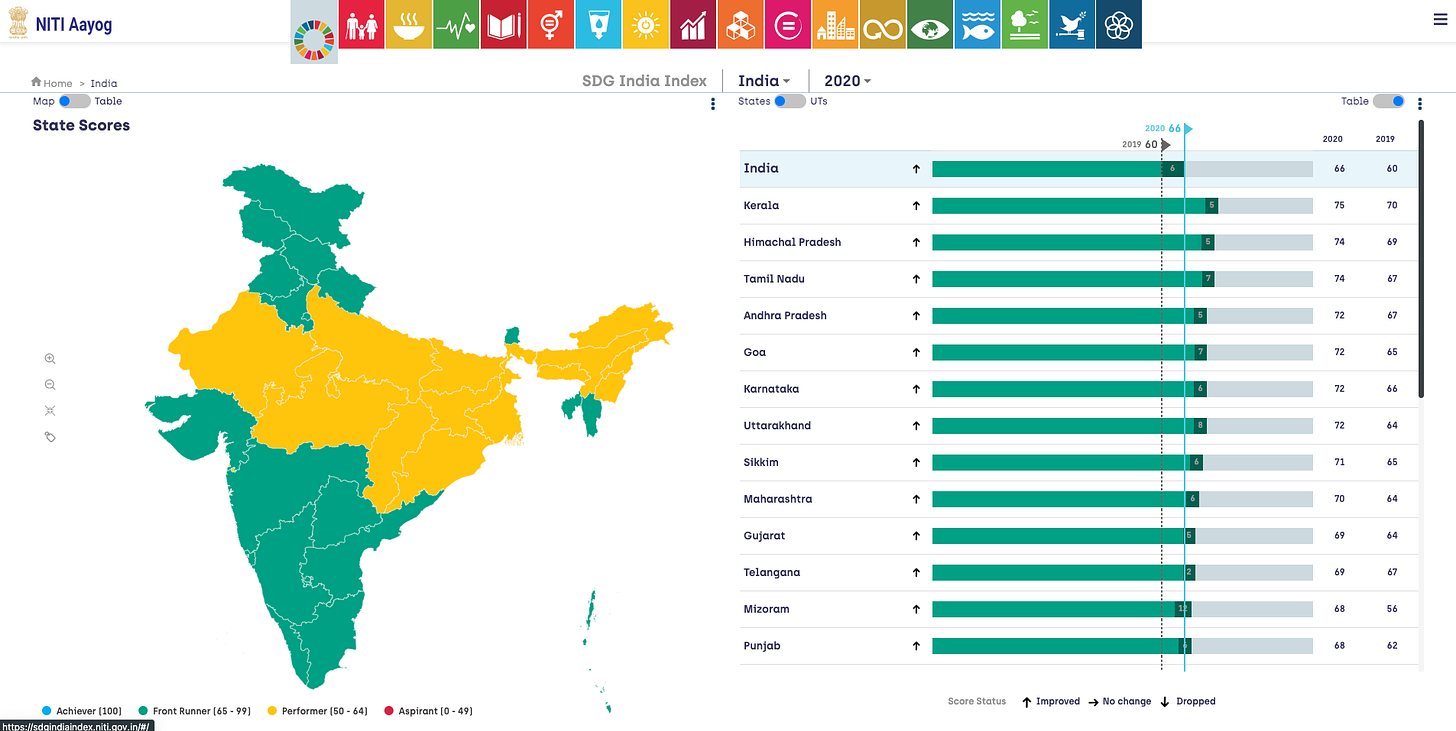
Comprehensive metrics to ensure policymaking is guided by the needs of people and planet
- Develop a conceptual framework to “value what counts”, anchored in the 2030 Agenda
- Develop value dashboard of key indicators
- Strengthen statistical capacity-building and data collection
- UN Data Commons for the SDGs
- SDG Transformation Center
We need a paradigm shift in what we measure as progress, so that we can capture data on the activities and outcomes that a society truly values and then use the data to better inform our policy and financial decisions.[13]

“Digital World Brain”
5. Open, free and secure Digital Future
Human-centred digital future anchored in human rights, enabling the SDGs
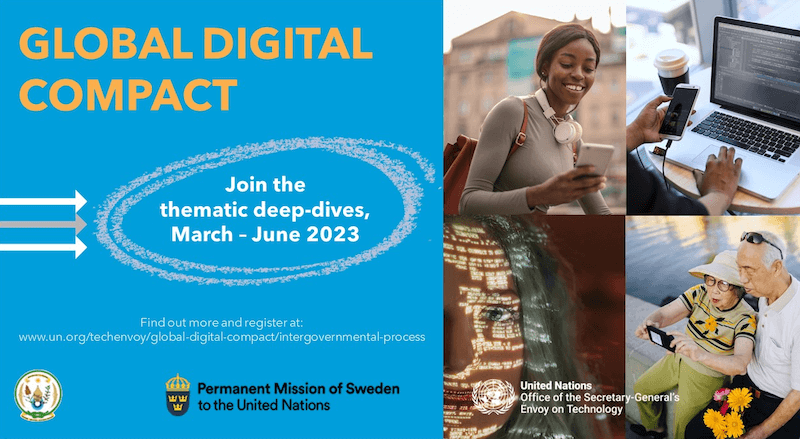
- Global Digital Compact
- AI Governance
- AI body to align artificial intelligence with human rights, the rule of law and the common good
- High-Level Advisory Body on Artificial Intelligence
- AI for Good
The transformative potential of AI for good is difficult even to grasp. And we are in urgent need of this enabler and accelerator. As many countries are already reeling from the impact of the climate crisis. The 2030 Agenda — our global blueprint for peace and prosperity on a healthy planet — is in deep trouble.[14]
AI could help to turn that around. It could supercharge climate action and efforts to achieve the 17 Sustainable Development Goals by 2030.

Click here to read the full article.
*
Note to readers: Please click the share button above. Follow us on Instagram and Twitter and subscribe to our Telegram Channel. Feel free to repost and share widely Global Research articles.
All images in this article are from the author


